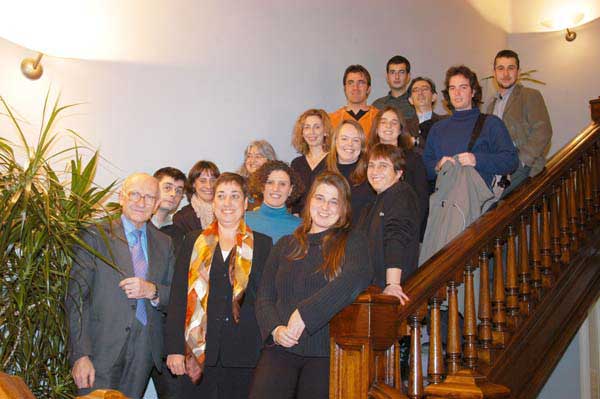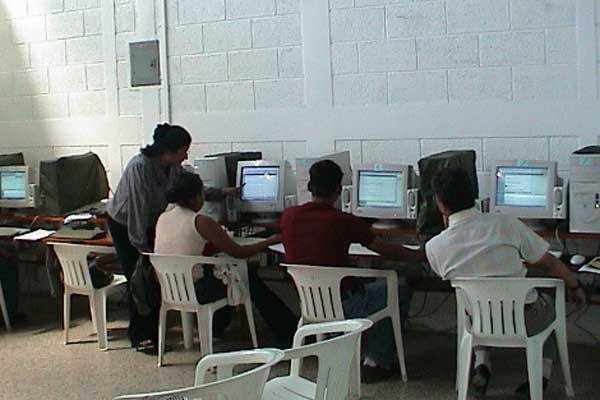By Ismael Peña-López (@ictlogist), 11 February 2004
Main categories: Read me also at...
No Comments »
[originally published in catalan in Línia Vallès, #59. Mollet del Vallès (Spain): 01/16/2004]
In a corner of Barcelona, at the end of Enric Granados Street, a bench has been upholstered. It is one of these benches that have lately been installed in the squares and circuses of our cities, with metallic legs and wooden sit and back and that, quite often, they are arranged as a three-piece suite: a large bench and two individual ones. The main character of this tale is an individual one.
The upholstery has been performed by a non-amateur: tough cloth, printed with a yellow and orange squares pattern according to the buildings around and the surrounding trees; filled with foam cut the same size of the constituting boards; and stapled professionally and with the most care and technique required.
And I’m still amazed: someone has bothered to upholster a street bench! I explain it to my friend and one of them says “it must have been some of these urban artists, what a sort of crazy people they are”. I guess these craziness is quite productive: instead of break, burn or sign the urban furniture, someone is wasting his precious time in improving it in the name of art: the roles have gone upside down and patrons of the arts in the society are, now, the artists themselves.
Let’s put it clear: facing facts like these, we must absolutely forget calling the Administration and other benefactors for grants and subsidies for art and culture. Artists have all their needs covered and, more, they even have time and money to devote to public works. I wonder why they don’t just fix some routes, build nurseries or avoid the erosion of the coast. In the end, I think all of these are priority actions before the comfort of street benches.
By the way, the Administration should keep on with his policy of encouraging whatever freak that might come with the aim of modifying the physics or chemicals of whatever thing he might find, in the name of nationalism, football or his or her political confusions. We should avoid paying our taxes and, on top of that, paying the unemployment subsidies of these people that, against odds, try to get us off the beastie prose.
By Ismael Peña-López (@ictlogist), 11 February 2004
Main categories: ICT4D, Online Volunteering
1 Comment »
[via info-commons.org]
“Volunteers from all over the world are helping organizations that serve communities in developing countries — but without leaving their own communities. These online volunteers translate documents, write articles, research data, build web sites, mentor young people, design logos, and engage in many other projects to benefit organizations serving people in the developing world.”
And I would add all the issues related to e-Learning
- Pedagogical design
- Pedagogical coordination
- Content authorship
- Tutorship
- Teaching
- Academic management
- Etc.
and everything related to technical backofficing.
All in all, e-volunteering will always, in my opinion, be related to knowledge management and knowledge-related tasks.
By Ismael Peña-López (@ictlogist), 10 February 2004
Main categories: ICT4D
No Comments »
So, the contest is over and the Alex goes to… ;)
Thanks everyone for taking part into it and, as Alex says, “the real winners here are the WordPress users who now have 38 new styles from this contest (45 total) they can use with the default WordPress template.”
By Ismael Peña-López (@ictlogist), 09 February 2004
Main categories: ICT4D, Online Volunteering
No Comments »
In fact this is just to bring some colour to this dull blog of mine, part II ;)
(I thought some snapshots would be welcome in this full-of-text page)
These

are some of the e-volunteers working at cooperation for development projects here at the Campus for Peace. We had a dinner with the Rector of the University last January.
There are
- pedagogues
- ICT experts
- ICT teachers
- training for e-trainers teachers
- virtual communities dinamizers
- etc
I’m also there: go find me! :)
By Ismael Peña-López (@ictlogist), 09 February 2004
Main categories: ICT4D
No Comments »
Nice article at Wired.com about e-fundrising: “To not have a Web presence in today’s world is ridiculous,” said CEO Russell Robinson. “Our website has helped us reach 57,000 new donors over the past two or three years. We had no idea who these people were until then.”
Nevertheless, I guess we should be able to know whether this is actual rising of number of donors or just web shifting of old ones. I’m sure both statements are true but, in what amout?
On the other hand, I was told by Medecins Sans Frontieres in Spain that most of these donors were, in fact, no donors but members paying on-line. Yes, I know it’s quite the same, but donorship means you hit the right people the right place and each one of them is something you can count individually each time it comes back to you. Instead, membership is something once you got you shouldn’t count it twice. The money you get is the same, but not the return of the investment you made in building up your web strategy in individual impacts.
We’ll wait and see how numbers speak.
[Thanks to my colleagues and friends C
By Ismael Peña-López (@ictlogist), 05 February 2004
Main categories: Education & e-Learning, ICT4D
No Comments »
In fact this is just to bring some colour to this dull blog of mine ;)
These:

are some of the teachers taking part in the project of the Campus for Peace and Foundation IWith called AbSoo.
The aim of the project is bringing university education to teachers at rural communities in Guatemala, Mexico and the Dominican Republic, using the e-learning platform of the Universitat Oberta de Catalunya (Open University of Catalonia), its e-learning materials and higly qualified volunteers previously trained by the University.
We’re very proud of the project as we’re running it at zero cost, as infrastructure is provided by the University or the Foundation and staff are mainly volunteers and regular staff from the University at the cooperation for development programme, the Campus for Peace.



